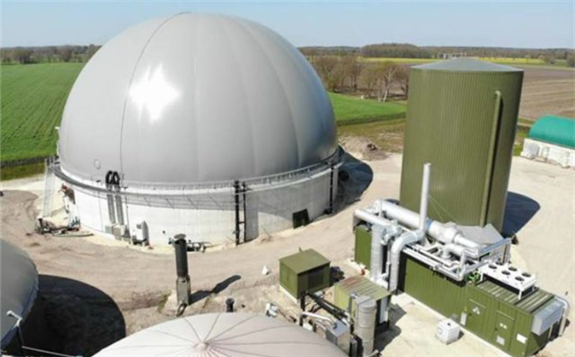In Wehrbleck in Lower Saxony, Germany, combined heat and power (CHP) specialist, ETW Energietechnik, has expanded an agricultural biogas plant into a regenerative storage power plant.

In addition to the new Flex CHP with the TCG 2020 V20 biogas engine from MWM (2MW of electric and 2.3MW of thermal energy), ETW also installed a combined gas storage tank and heat storage tank of 1,000 cubic metres.
The total investment amounts to 1.6 million euros ($18.3 million).
Since 2001, farmer Andreas Rohlfs has been operating a biogas plant with an area of around 235 hectares. Based on the input materials maize, dung and liquid manure, the operator generated around 5.4 million kilowatt-hours of electrical energy and 4.1 million kilowatt-hours of thermal energy before the expansion.
Since its expansion into a storage power plant, the plant now produces 5.7 million kilowatt hours of electrical energy and almost 5.8 million kilowatt hours of heat per year.
The electricity is fed into the grid; the waste heat is fed into a district heating network for heating private and municipal buildings and is used to dry wood chips. Part of the heat is diverted to keep the engine warm when it is not running. This allows a quick restart of the engine if necessary and immediate access to the full output of the CHP.
In addition to the increase in output, the plant now operates flexibly. In return, Rohlfs will earn an additional flexibility surcharge of 40 euros ($46) per kilowatt over the next five years.
The main advantage of the Flex CHP is that the plant is now operated in such a way that electricity and heat can always be fed in at the most productive time of day. For this purpose, the biogas plant is controlled in such a way that the storage tanks are always optimally filled when prices are at their highest and that the largest possible quantities of electricity and heat are available for this purpose.
The plant is powered by desulphurised biogas. For this purpose, the sulphur content is conditioned down from around 5,000 parts per million (ppm) to around 2 ppm. A safety alarm with integrated stop of the gas supply to the storage protects the CHP at a sulphur content above 2 ppm. This is particularly necessary because the sulphur content can rise faster in flex operation. After the preventive shutdown, operation of the engine is maintained with the gas from the storage tank.
Alexander Szabo, sales manager at ETW Energietechnik: “In order to be prepared for future NOx limits, ETW has already reserved the necessary space on the CHP container for an SCR catalytic converter. The plans also take into account a reserve for exhaust back pressure.”
The variation of the substrate quantities also contributes to the flexibility of the CHP operation. This makes it possible to reduce biogas production at low electricity prices so that the CHP unit can be shut down for up to two days if necessary without overloading the gas storage tank.
The heat storage tank can store 40,600 kilowatt hours of thermal energy and thus supply the heating network for around 50 hours without the CHP unit having to be put into operation.
The CO2 savings achieved by the regenerative storage power plant in electricity production can be estimated at 2,683 tonnes per year and in heat production, including process heat, at around 1,300 tonnes.